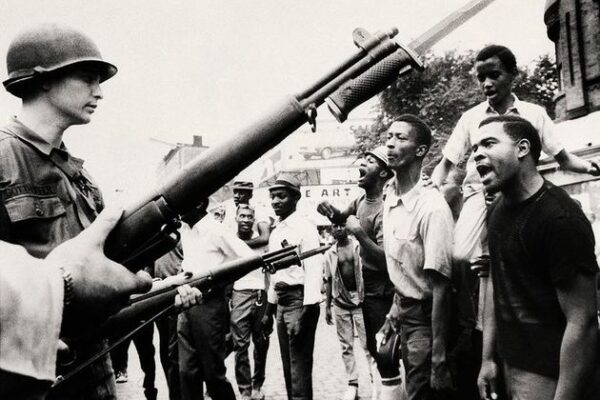To commemorate the 50th anniversary of the Newark Rebellion, the ACLU-NJ revisits the events of July 12-17, 1967, on Twitter. Follow @Newark1967 to see how those six days unfolded, in real time.
How the Rebellion Started
On July 12, 1967, in Newark, at about 9:30 p.m., John Smith was pulled over. A little later, Smith, a Black cab driver, was dragged out of his car and brutally beaten by police. His attackers then arrested him on charges of assault.
News spread, and Newark residents rose up.
The uprising and police violence lasted for six days, resulting in 26 deaths and thousands of injuries and arrests – overwhelmingly affecting Black residents.
Civil Rights in Newark: 1967 and 2017
The unrest in 1967 Newark was fueled by racial disparities in policing and arrests, unequal access to resources and opportunities, and civic disenfranchisement – issues New Jersey still faces. In 2016, nearly 50 years after Newarkers first called for federal oversight of the Newark Police in response to the police abuses brought to light by the rebellion, the Department of Justice signed a consent decree with the Newark Police to rein in civil rights abuses. Also in 2016, after a community-led campaign, Newark put in place a civilian complaint review board with the potential to be one of the strongest in the country.
We at the ACLU-NJ and our partners in Newark Communities for Accountable Policing, a grassroots coalition calling for police accountability, are still pushing for close oversight and enforcement of the consent decree and a strong civilian complaint review board.
The ACLU-NJ's Role
The ACLU of New Jersey played an important role during and after the rebellion, as a headquarters for advocates and media, and as civil rights lawyers. The organization filed several lawsuits against the Newark Police Department in the aftermath, including a groundbreaking one that called for the federal government to step in to end the department’s widespread civil rights abuses.
Rebellion Resources and References
For further exploration of the Newark Rebellion, these resources, many of which the ACLU-NJ used in creating the @Newark1967 live-tweets, are a good place to start. However, listing it here doesn’t necessarily mean the ACLU-NJ shares an author’s viewpoint. We can’t confirm the accuracy of sources other than those from the ACLU-NJ directly.
Books on the Newark Rebellion
- Curvin, Robert. Inside Newark: Decline, Rebellion, and the Search for Transformation. New Brunswick, N.J.: Rutgers University Press, 2014.
- Hayden, Tom. Rebellion in Newark: Official Violence and Ghetto Response. New York, N.Y.: Random House, 1967.
- Mumford, Kevin. Newark: A History of Race, Rights, and Riots in America. New York, N.Y.: New York University, 2007.
- Porambo, Ron. No Cause for Indictment: An Autopsy of Newark. New York, N.Y.: Holt, Rinehart and Winston, 1971.
- United States Kerner Commission. The Kerner Report: The 1968 Report of The National Advisory Commission on Civil Disorders. New York, N.Y.: Pantheon, 1988.
50th Anniversary Web Resources
- “The Newark Rebellion,” Rise Up North Newark
- “The Occupation of Newark,” Tom Hayden
- “Remembering the 1967 Newark Rebellion,” Rise Up North Newark
- “Crossroads: The 1967 Riots,” NJ.com
- “Rebuilding Life in Newark After the 1967 Riots,” Talking Eyes Media
- “Voices From the Rebellion” exhibit, Newark Public Library

